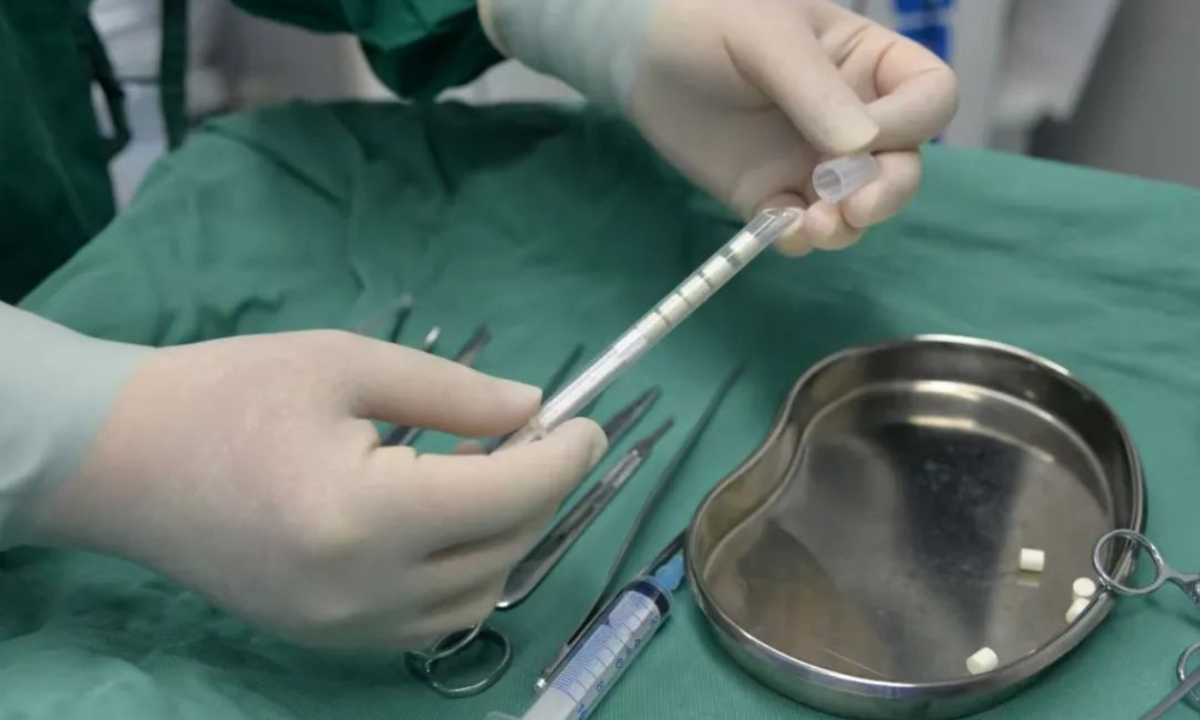
Photo: From official WeChat account of the Health Commission of Anhui Province
A special “sobriety chip” has recently been successfully implanted into an alcoholic’s body in East China’s Anhui Province for the first time, significantly reducing the patient’s craving for alcohol and offering a more effective solution for quitting drinking.
The implantation surgery was performed on a male patient surnamed Li at the Yingdong branch of Fuyang City Third People’s Hospital on Tuesday, Chinanews.com reported.
The 40-something man has struggled with anti-alcohol for more than 20 years. Excessive drinking caused him to have a temper and frequent arguments with his family, binging significant distress to the whole family.
Li’s alcohol dependence has temporarily relieved with the intervention of a multidisciplinary team, including the substance dependence department at the hospital, in recent years. However, he relapsed each time after returning home after treatment. Li has been hospitalized nine times due to his frequent relapses..
After the hospital introduced the new “sobriety chip” therapy, Li proactively discussed it with his family and decided to try the treatment.
The “sobriety chip” is not an electronic device, but rather the sustained release naltrexone hydrochloride, a prescription medication used to treat alcohol disorder. It is implanted into the alcoholic’s body through minimally invasive surgery to help him suppress the psychological craving for alcohol, reducing the risk of relapse.
Li’s surgery was carried out under local anesthesia after a careful and thorough evaluation on the morning of April 8, said the report.
Through a small incision of one centimeter long in the subcutaneous fat layer of Li’s lower abdomen, the doctors at the hospital implanted 10 naltrexone hydrochloride pills, each about the size of a soybean. The procedure of the operation took less than five minutes.
The medicine takes effect within four hours after the implantation and the medicine can be steadily released in the body for over six months, effectively preventing missed or forgotten doses. Most patients require only a single implantation, said the report.
It has shown that the “sobriety chip” treatment has significantly reduced the patient’s desire for alcohol, aiding him in overcoming addiction both psychologically and behaviorally, and providing a more effective solution for quitting drinking.
A number of cities in China, such as Chengdu in Sichuan Province, Wenzhou in Zhejiang Province and Zhumadian in Henan Province, have announced the successful completion of their “sobriety chip” implant surgeries in recent days.
The new therapy has been reportedly practiced in multiple hospitals across the country since the beginning of this year. Last month, a long-time alcohol addict surnamed Wang in Chifeng, Inner Mongolia became the region’s first patient to undergo the treatment, cnr.cn reported on March 3.
In February, a 35-year-old patient surnamed Wu, the first patient who received the treatment at Shiyan Hospital of Traditional Chinese Medicine in Shiyan city, Hubei, told the media that he couldn’t resist the temptation of alcohol as soon as he saw it in the past. However, after the surgery, even the smell of alcohol made him feel uncomfortable, and he reported no cravings whatsoever, 10yan.com reported.
The therapy was developed under the leadership of the Second Xiangya Hospital of Central South University in Central China’s Hunnan Province. Between April of 2023 and September of 2024, the hospital conducted a multicenter, randomized, double-blind phase II clinical trial on the naltrexone hydrochloride implant.
The summary report released in November of 2024 indicated the drug demonstrated good safety, with no significant differences in adverse reactions compared to the placebo, except for those at the implantation site. In addition, it significantly reduced patients’ total alcohol consumption, heavy drinking volume, and the number of heavy drinking days.
Lan Jun, a doctor from The Guangxi Zhuang Autonomous Region Brain Hospital, said alcohol dependence is a difficult-to-treat chronic brain disorder, and traditional treatment methods often yield poor results with high relapse rates. The new therapy offers a new treatment pathway for such patients, with the potential to improve success rates and quality of life for patients.
Global Times




